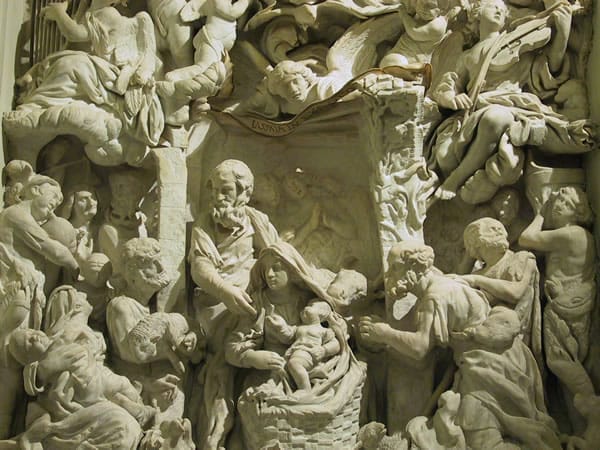One of the most important pagan festivals in the first centuries of Christianity was one dedicated to the “Sol invictus”, celebrated from the 24th to 25th December. This had been introduced to the calendar by the Emperor Aurelianus in 274. The Catholic Church would set the feast of Christmas on the same date to symbolise that the true and invincible sun is Christ, the God who becoming man came to save mankind.
This element of the true light that has been born from above will not be absent from some of the sermons that St. Augustine preached at Christmas time. In sermon 186 Augustine, inviting the faithful to be joyful, says: “Let us rejoice, brothers; let all peoples exult and be joyful. The sun we see did not make this day sacred but rather its invisible creator, when a Virgin Mother, from her fruitful womb and her virginal integrity brought forth into our world, made visible for us, its invisible creator” (s.186, 1)
Humility
However one of the elements that constantly appears in Augustine’s Christmas homilies is that of humility. Christ is the humble God who divests himself of the dignity that corresponds to him as God and takes on our human nature, with all that entails. Whoever is proud cannot enter through the humble and simple door of Christ incarnate: “The faith of Christians knows well what the humility of so great a one has brought us; the hearts of the unbeliever are kept at a distance because God has hidden these things from the learned and the clever and revealed them to mere children. Let the humble take to themselves the humility of God and so reach the height of God, too” (s.184, 1)
For St. Augustine Christmas is the feast of Christ’s humility, of the Christian God who out of love became man, who wanted in his humble state to be led by the hands of a woman, to be weaned at her breasts, and placed in a humble manger: “The Truth that holds the world in being, has sprung up in the world to be led by the hands of a woman,. The Truth that feeds, in an everlasting way, the blessedness of the angels has sprung up from the earth to be suckled at a mothers breasts. That Truth that heaven cannot hold, has sprung up from the earth and been laid in a manger” (s. 185, 1)
To take in the grandeur of the mystery of Christmas we must needs contemplate it as a mystery of love. God loves us so much that he takes on our human nature. God’s infinite day approached man’s finite day. And so the believer is called to praise God, to offer eternal thanks and love God in return: “What praises shall we proclaim, then, to this love of God! How many thanks ought we to give him! He loved us so much that he, by whom all time exists, was made in time for our sake (….) such was his love that he who made man became a man (…) (s. 188, 2).
The mother
A second element that stands out and is constant through the very important role of Mary – Augustine in his Christmas homilies develop a rich doctrine on Mary-.This second point is his insistence on joy and happiness. St. Augustine never ceases to invite his faithful to be happy: “Let us celebrate with joy the day Mary gave birth to the Saviour” (s. 188, 4); “let us celebrate with joy the arrival of our salvation and redemption…(s. 185, 2); “Let the world rejoice, then, through the believers, for whose salvation the Saviour came into the world” (s. 187, 4)
Let us all exult in this feast of Christmas, for Christ is the Redeemer and Saviour of us all: “Let the weak and infirm rejoice: the Saviour has been born. Let the prisoners exult: the Redeemer has been born. Let the servants rejoice: the Master has been born; Let all the free rejoice : the liberator has been born. Let all Christians exult: Christ has been born” (s. 184, 2)


